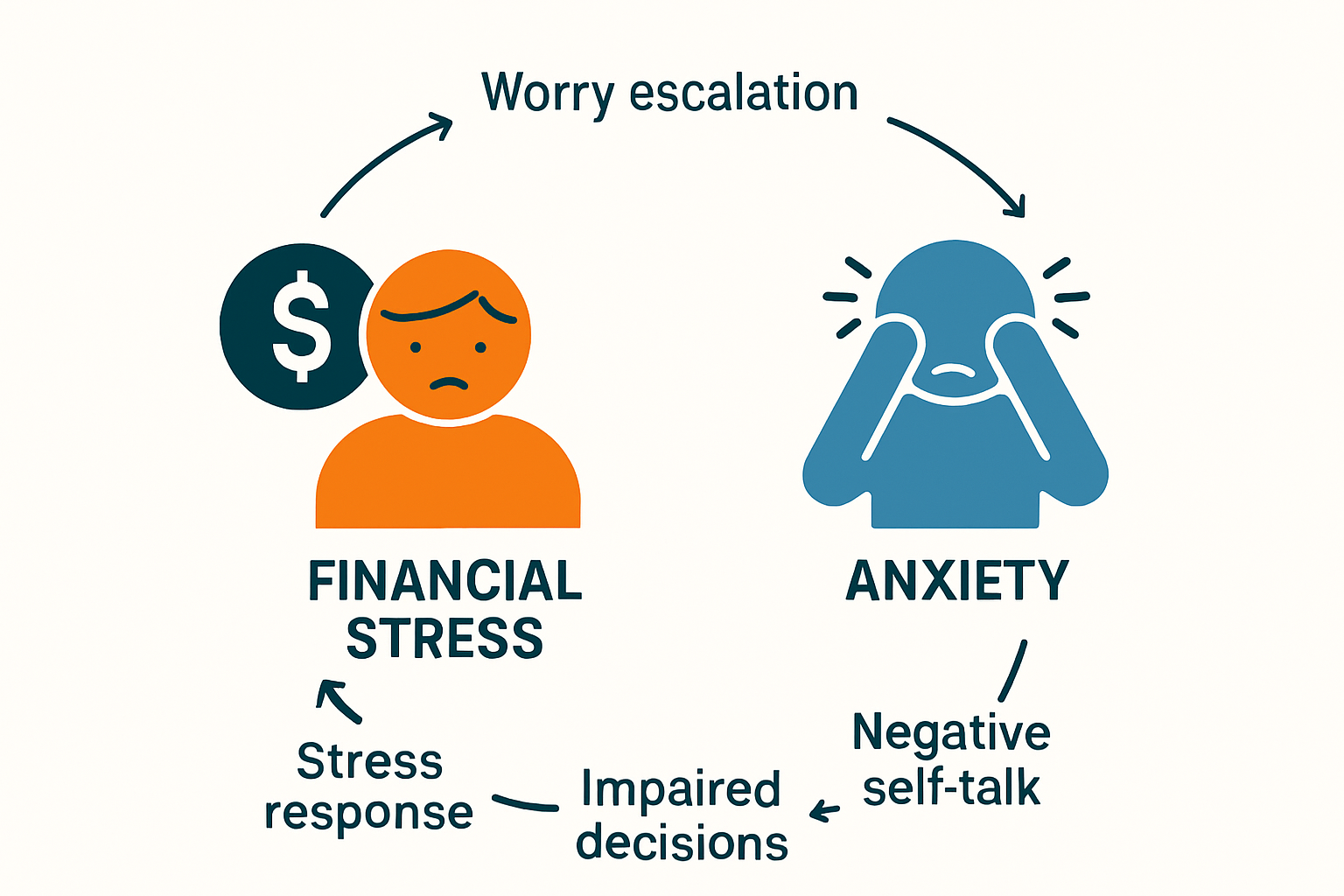
Tips for Stress Free Life That Improve Your Wellbeing
Learn actionable tips for living a stress free life and enhancing your overall wellbeing through min...
This article explains how therapy can help manage financial stress and end exhausting anxiety loops.
Financial stress weighs heavily on millions across the globe and often kicks off a tiring loop of anxiety that can take a toll on both mental health and the ability to make sound decisions, making therapy for financial stress an important consideration.
Financial stress creeps in when people feel like their money or resources aren’t stretching far enough to meet their needs or expectations. It usually pops up because of debt, unpredictable income or surprise expenses that throw a wrench in the works.
When financial stress comes knocking the body’s natural fight-or-flight alarm bells start ringing and flood the system with stress hormones like cortisol. On the psychological side this usually cranks up feelings of worry and helplessness and keeps anxiety stuck on repeat. Physically individuals tend to battle muscle tension and feel utterly drained. Sleep also plays hard to get.
Financial stress and anxiety often feed off each other and create a tough cycle that’s easier said than broken. Worrying about money can spark anxious thoughts that fog up clear thinking. Before you know it, people start dodging their financial issues like the plague.

Therapy for financial stress is a targeted form of mental health support that focuses on the emotional and behavioral challenges tied to juggling money matters. Unlike typical therapy or plain financial advice, it mixes psychological techniques with hands-on financial know-how to boost your coping skills and sharpen decision-making for your dollars and cents.
Therapists help clients uncover and challenge harmful financial beliefs that sneak into our minds and nudge them toward feeling more empowered and in control. By tackling mindset and actions head-on, this approach often leads to lasting improvements not just in emotional wellbeing but in financial health too.
Therapy helps break the relentless cycle of financial stress and anxiety by guiding clients to gain real insight and manage their emotions more effectively. It also helps build practical skills that actually stick.
A client wrestling with debt discovered through therapy that taking things one small step at a time while gently challenging harsh self-critical thoughts and facing overdue bills head-on instead of dodging them made a real difference.
Therapists often share handy techniques that clients can try on their own to boost self-awareness and regain control when things feel overwhelming. Some go-to methods include journaling about knotty financial emotions, practicing mindful budgeting, visualizing your goals like painting a mental masterpiece, and slipping in relaxation exercises to melt away the physical tension that financial stress tends to cause.

It’s vital to keep an eye out when financial stress begins to sneak into your daily routines or starts weighing on your mental health, since that’s often a good clue that therapy could be worth a shot. Tracking down a therapist who really gets financial stress usually involves digging into their qualifications, getting a handle on the kinds of therapy they provide.
Trusted therapist directories like Psychology Today or GoodTherapy often let you zero in on those who specialize in financial stress, which is a relief when you’re feeling overwhelmed. Professional groups typically offer therapist listings and can lend a hand in verifying credentials, so you’re not going in blind. Many therapists accept insurance or offer sliding scale fees, making therapy a bit easier on the wallet—that’s always a plus.
Alongside therapy, weaving in other lifestyle strategies can truly ease the weight of financial stress. Think of tools that sharpen your budgeting skills and mindfulness practices that help smooth out tension. Peer support networks make it easier to face challenges while offering a shoulder to lean on.
Therapists keep an eye on client progress by using symptom checklists and behavioral observations. They also use self-report scales that focus on anxiety and financial habits. Clients often notice improvements by tuning into changes in how they feel emotionally and whether they are staying on top of bill payments or how confident they sound when chatting about money.
| Metric | Early Stage | Mid Stage | Advanced Stage |
|---|---|---|---|
| Symptom Reduction | Frequent anxiety and intrusive thoughts tend to pop up regularly, making daily life a bit of a rollercoaster | Anxiety settles into a more moderate groove, with the occasional spike reminding you it’s still there | Anxiety episodes become few and far between, with much better control and breathing room to think clearly |
| Financial Behavior Changes | Dodging bills and budgeting feels like a full-time job you’d rather avoid | Starting payment plans and actually keeping tabs on budgets shows you’re slowly getting a handle on things | Regular bill payments and actively saving become part of the routine—finally, some peace of mind on the money front |
| Emotional Wellbeing | High stress levels and mood swings that can feel like a wild ride | Mood starts to stabilize, with fewer moments of irritability that once seemed all too common | A steady calm settles in, backed by positive self-talk that keeps the inner critic quiet |
| Practical Financial Metrics | Debt piles up or spins out of control, a weight that’s hard to shake off | Debt is on the retreat, thanks to better credit monitoring and smarter moves | Savings are holding steady or growing, and debt is well in check—things are finally looking up |
Sustaining progress really boils down to regularly practicing the skills you’ve picked up and taking a moment now and then to check in with yourself. Therapy for financial stress, through keeping in touch with therapists or support groups, can be a real lifesaver, helping you sidestep setbacks and stay nimble when those new financial challenges come knocking.

Learn actionable tips for living a stress free life and enhancing your overall wellbeing through min...

Learn advanced tips and expert techniques to help young athletes build mental toughness, stay focuse...

Language processing disorder impacts how children understand and use language. Learn to recognize ea...

Spotting the signs of a toxic relationship early can save your emotional health. Discover key red fl...